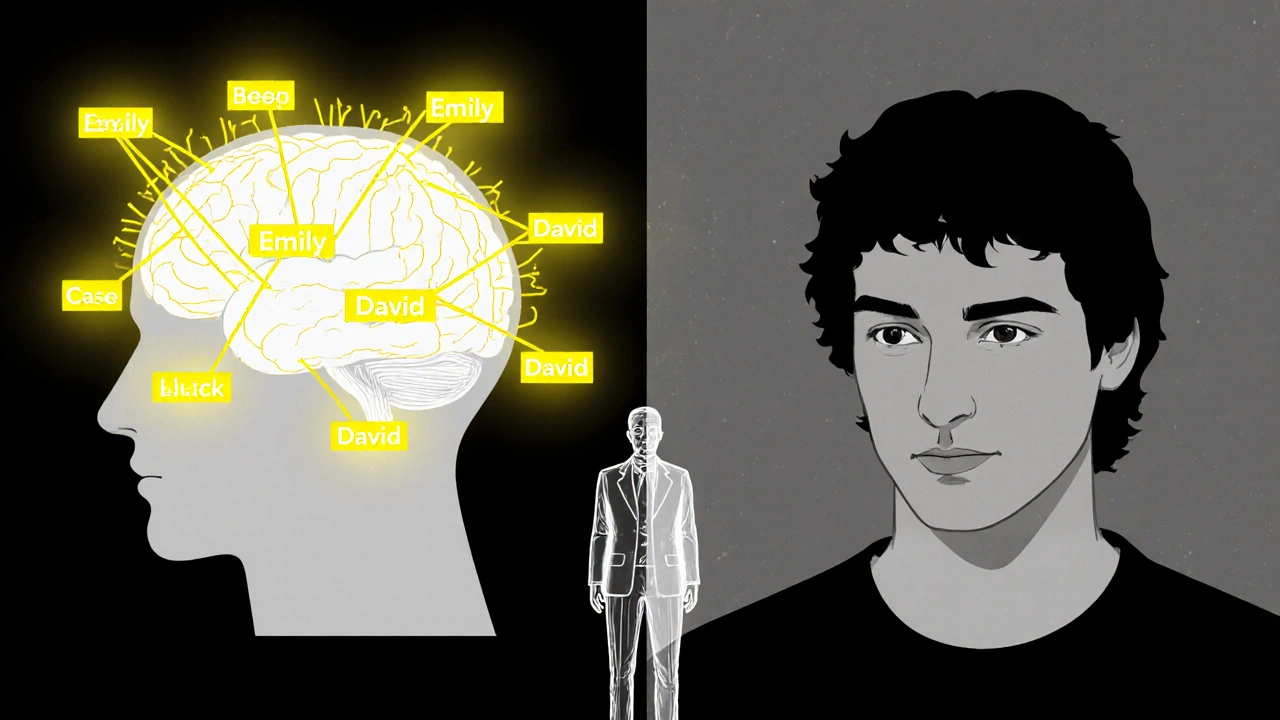Ever watched a mentalist walk up to a stranger, ask them to think of a name, and then instantly say it out loud-like they just pulled it from thin air? It feels like magic. But it’s not. It’s psychology, preparation, and a whole lot of clever misdirection. Mentalists don’t read minds. They read people. And guessing names? That’s one of their oldest, most effective tricks.
It’s Not Magic, It’s Pattern Recognition
Most people assume mentalists have some supernatural ability to pull names out of the air. But here’s the truth: names aren’t random. They follow patterns. In the U.S., the top 100 male and female names cover over 60% of the population. Names like James, Michael, Sarah, and Jennifer appear again and again. A mentalist doesn’t guess randomly-they guess probable.
Think about it: if you ask someone to think of a name, what’s the first one that pops into their head? It’s usually someone they know-family, a friend, a celebrity. And those names? They’re almost always from the top 500 most common names in the country. A mentalist studies lists of popular names, not just from the U.S., but from other cultures too. They know that if you’re in Los Angeles, names like Diego, Sofia, or Ethan are more likely than something obscure like Xanthippe or Zephyr.
The Power of Suggestion
One of the most common techniques is called forcing. It sounds simple: you don’t actually guess the name. You make the person think of the name you want them to think of.
Here’s how it works: a mentalist might say, “Think of a name-any name. Maybe someone from your childhood. Or a famous actor. Or even a character from a movie.” That’s not a free choice. That’s a carefully crafted suggestion. The mind latches onto the first thing that fits the categories you just gave. If they mention a movie, they’re more likely to pick Tom Cruise or Emma Stone than someone obscure. If they think of childhood, they’ll pick a parent’s name-often one that’s common.
Some mentalists use a technique called priming. Before the trick, they casually mention a name in conversation. “Oh, my neighbor’s daughter is named Olivia-she’s adorable.” Later, when they ask the audience to think of a name, Olivia pops into their head without them realizing why. It’s called the mere exposure effect-people start liking or remembering things they’ve heard before, even if they don’t consciously notice it.
Cold Reading: Reading Between the Lines
Cold reading is the backbone of mentalism. It’s not about knowing the answer. It’s about getting the person to tell you the answer-without realizing they’re doing it.
Imagine this: a mentalist says, “I’m getting a name starting with a J… maybe two syllables? It feels like a name that’s been around for a while.” The audience member thinks, “Hmm… James? Jennifer?” The mentalist watches their face. A slight nod? A blink? A pause? That’s all they need. They say, “James?” The person says yes. Mission accomplished.
But what if they guess wrong? The mentalist doesn’t panic. They pivot. “Wait-was it more modern? Maybe Jayden? Or maybe it’s a nickname? Like Jack?” They keep offering options until one sticks. People naturally want to help. They’ll confirm the closest match, even if it’s not exactly what they thought. That’s called subjective validation-the brain accepts vague statements as accurate because they feel right.

The Name List Trick
One of the most reliable methods? The pre-written list. A mentalist might hand you a small card and say, “Write down any name-don’t show me.” While you’re writing, they’ve already memorized a list of 10-15 common names. When you hand the card back, they pretend to concentrate, then say, “I’m getting… Sarah.” You say, “Yes!”
But here’s the catch: you didn’t write Sarah. You wrote Samantha. But Sarah is close enough. The mentalist didn’t guess your name-they guessed your intention. Most people won’t correct them unless the name is wildly off. And if they do? The mentalist just smiles and says, “You’re right-I felt the ‘S’ sound. That’s why I said Sarah.” They turn your correction into part of the trick.
Body Language and Microexpressions
People give away more than they know. When someone thinks of a name they love, their face lights up. When they think of a name they dislike, their jaw tightens. A mentalist watches for micro-movements: a raised eyebrow when they hear “Emily,” a slight shrug when they hear “Kevin.”
Even breathing changes. When you think of a name that feels personal-like your mom’s name-you might take a tiny, almost invisible breath. A trained observer notices that. It’s not mind reading. It’s reading the body’s silent reactions.
How to Spot a Fake Mentalist
Not every person who claims to guess names is a real mentalist. Here’s how to tell the difference:
- Real mentalists don’t say, “I’m reading your mind.” They say, “I’m sensing a name.” Language matters.
- They never ask for confirmation too early. If they say, “Is it John?” right away, they’re guessing. A skilled one waits, builds tension, and offers options.
- They use ambiguity. “I see a name that starts with an M… maybe with an ‘e’ sound?” That’s not a guess-it’s a net.
- They don’t rely on assistants. If someone whispers a name to the mentalist, it’s not mentalism. It’s a setup.
Real mentalists make you feel like you chose freely-even when you didn’t. That’s the art.

Why This Trick Works So Well
Humans are pattern-seeking creatures. We want to believe there’s meaning in randomness. When a mentalist guesses a name correctly, we don’t think, “They probably picked a common name.” We think, “How did they know?”
That’s the illusion. The trick isn’t in the name-it’s in the story. The mentalist turns a statistical probability into a moment of wonder. They make you forget about the 99 other times they guessed wrong. You only remember the one time they got it right.
And that’s the real magic.
Can You Learn to Do This?
Yes. You don’t need psychic powers. You need practice and observation.
Start by memorizing the top 100 male and female names in your country. Then, in casual conversations, ask people to think of a name. Guess. Track your accuracy. Notice how often you’re close. You’ll start seeing patterns: people pick names from their family, favorite shows, or childhood friends.
Practice cold reading. Say things like, “I’m getting a name that’s two syllables… maybe ending in ‘a’?” Watch their reaction. Adjust. Learn what works.
And remember: the goal isn’t to fool people. It’s to understand how the mind works. That’s where the real power lies.
Do mentalists really read minds?
No. Mentalists don’t read minds. They use psychology, observation, and clever wording to guide people into revealing information they think they’re keeping private. It’s not supernatural-it’s science and showmanship combined.
What’s the most common name mentalists guess?
In the U.S., names like James, John, Sarah, Jennifer, Emily, and Michael are guessed most often. These names appear in the top 10-20 most popular names for decades. Mentalists use these as their default guesses because they’re statistically likely.
Can I use these tricks on my friends?
Absolutely. Many people use mentalism techniques as party tricks or icebreakers. But don’t use them to deceive or manipulate. The best version of this trick is the one that leaves people amazed-not fooled. Focus on wonder, not control.
How do mentalists remember so many names?
They don’t memorize every name. They memorize patterns. They study lists of common names by region, age group, and culture. They also use memory techniques like the method of loci-associating names with visual locations in their mind. But most of the time, they rely on probability, not recall.
Are mentalists the same as magicians?
They’re related, but different. Magicians focus on physical illusions-cards, coins, disappearing objects. Mentalists focus on the mind-thoughts, emotions, memory. Some performers do both, but the tools and techniques are distinct. Mentalism is psychological; magic is physical.
What to Do Next
If you’re curious about how the mind works, start small. Practice asking friends to think of a name and guess it. Don’t worry about being right every time. Pay attention to how they react. Notice when they hesitate, smile, or look away. That’s the real lesson.
Read books like The Full Facts Book of Cold Reading by Ian Rowland. Watch performers like Derren Brown or Banachek. Notice how they pause. How they speak. How they let silence do the work.
And remember: the next time someone guesses your name like magic, don’t be impressed. Be curious. Because the real magic isn’t in the trick-it’s in how easily we let ourselves believe it.


Patrick Sieber
November 15, 2025 AT 09:26That’s actually kind of beautiful when you think about it. Not magic, not mind reading-just human psychology laid bare. We’re all predictable in the best and worst ways. The fact that someone can turn that into wonder instead of manipulation? That’s art.
Kieran Danagher
November 15, 2025 AT 23:57Yeah right. Next you’ll tell me the guy who guesses your birthday at the carnival is a genius because he knows 12% of people are born in July.
OONAGH Ffrench
November 17, 2025 AT 01:21People don’t realize how much they give away with a single glance. The mind doesn’t lie. It just gets distracted by the noise around it. Mentalists aren’t tricking you. They’re just quieter than you are.
poonam upadhyay
November 18, 2025 AT 05:09OMG this is so deep like literally?? I mean, have you ever thought about how your subconscious is just a puppet for societal norms?? Like, why do we even HAVE top 100 names?? Who decided that? Capitalism?? Patriarchy?? I’m literally shaking right now. This isn’t mentalism-it’s systemic oppression disguised as entertainment!!
Shivam Mogha
November 19, 2025 AT 16:09Names are common. That’s it.
mani kandan
November 19, 2025 AT 17:19There’s something almost poetic about how we cling to the illusion of mystery. We’d rather believe in magic than admit we’re statistically predictable. The real trick isn’t the guess-it’s how willingly we let ourselves be fooled. I’ve tried this on friends. Most of them don’t even notice when I nail it. They just smile and say ‘how?’ Like it’s a gift.
Rahul Borole
November 21, 2025 AT 01:42It is imperative to recognize that the psychological mechanisms underpinning mentalist performances are not merely anecdotal but empirically validated through cognitive behavioral studies. The mere exposure effect, subjective validation, and forced choice paradigms are well-documented phenomena in peer-reviewed literature. Mastery of these principles requires disciplined observation, rigorous data aggregation, and an unwavering commitment to ethical application. One must never exploit these techniques for deception, but rather as a tool for understanding human cognition.
Sheetal Srivastava
November 22, 2025 AT 06:45Ugh. This is just another performative narcissism masquerading as enlightenment. You’re not ‘understanding the mind’-you’re weaponizing cognitive biases to make yourself feel superior. And don’t even get me started on the colonial undertones of using ‘common names’ as if the whole world runs on American naming conventions. What about non-binary names? Indigenous names? Names that don’t fit your binary spreadsheet? This isn’t psychology-it’s cultural erasure dressed up as curiosity.
Bhavishya Kumar
November 24, 2025 AT 05:48There is a grammatical error in the phrase 'They don’t read minds. They read people.' It should be 'They do not read minds. They read people.' The contraction 'don't' is informal and inappropriate in formal discourse. Also, 'micro-movements' is hyphenated incorrectly. It should be 'micro movements' without the hyphen. This article is otherwise accurate but lacks academic rigor.
ujjwal fouzdar
November 25, 2025 AT 20:28What if… the real trick isn’t the name? What if it’s the silence after? The way your breath catches when someone says ‘Sarah’ and you realize… you didn’t even know you were thinking it. What if the magic isn’t in the guess-but in the moment you forget you’re being watched? We think we’re the ones choosing. But maybe… we’re just the echo.
Shivani Vaidya
November 27, 2025 AT 04:59I’ve used this with my students. Not to impress them. Just to show them how their own minds work. One girl said she thought of her grandmother’s name. I guessed ‘Mary’. She said yes. Then she started crying. Not because I got it right. Because she hadn’t thought of her in years. That’s the real power. Not control. Connection.
Rubina Jadhav
November 27, 2025 AT 19:02I tried this on my cousin. Said ‘Emily’. She said yes. Turned out she was thinking of Emily from Friends. I didn’t know that. She just smiled. We laughed. That’s all I wanted.
sampa Karjee
November 28, 2025 AT 07:57How quaint. You all treat this like some harmless parlor game. But let’s be honest-this isn’t about psychology. It’s about control. The mentalist doesn’t want you to feel amazed. They want you to feel small. To believe that your private thoughts are vulnerable to someone who studied a list. You think you’re learning about the mind? No. You’re being trained to accept surveillance as entertainment. This isn’t insight. It’s a micro-aggression dressed in a velvet coat. And you’re all applauding.